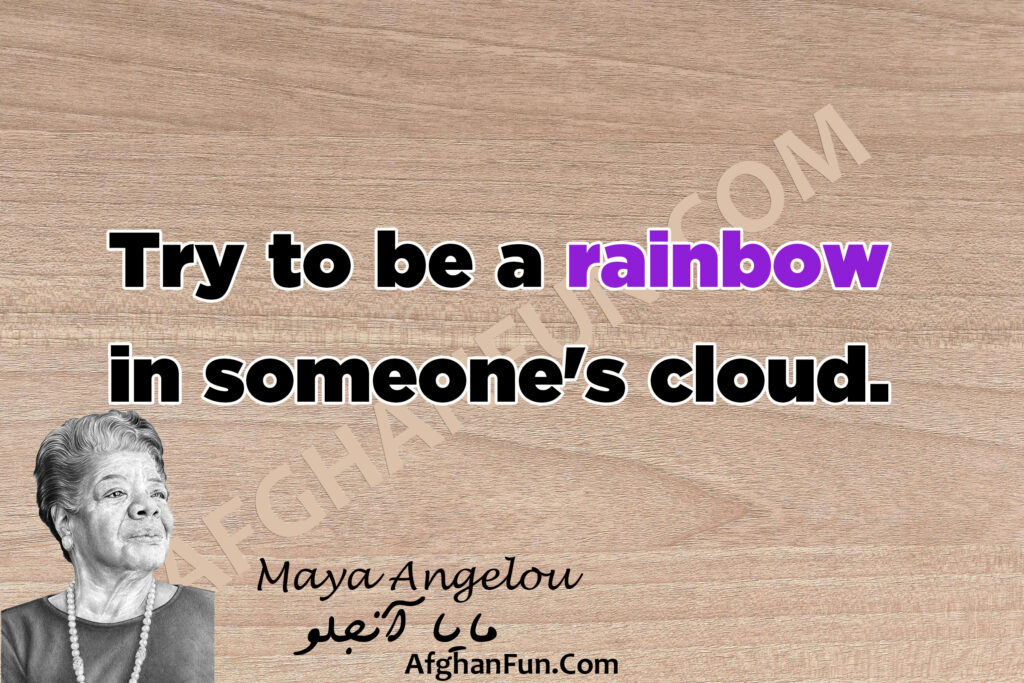
Try to be a rainbow in someone’s cloud.
Maya Angelou
Кӯшиш кунед, ки дар дили осмони абриидигар як камончаи рангин бошед.
Майя Ангелу
کوشش کنی رنگینکمانی در دل آسمان خاکستری دیگری باشی.
مایا آنجلو
.كُن كَقَوْسِ قُزَحٍ يُنِيرُ سَماءَ قَلْبِ أَحَدٍ
مايا أنجيلو
Maya Angelou’s quote, “Try to be a rainbow in someone’s cloud,” is both poetic and profound. It carries with it a message about the power of kindness, empathy, and the impact one can have on another’s life, especially during difficult times.
Analysis:
Metaphor of the Rainbow:
A rainbow is often seen as a symbol of beauty, hope, and something that appears after a storm. When Angelou refers to being a “rainbow,” she’s encouraging individuals to offer a burst of light, joy, or hope in someone else’s life—especially during their darker or more challenging moments (represented by the “cloud”). A rainbow, by its very nature, is rare, colorful, and beautiful, so it suggests that we should strive to bring something extraordinary and uplifting to the lives of others.
Cloud as a Symbol of Struggle or Hardship:
The “cloud” in the quote can symbolize the challenges, burdens, or sadness that people experience in life. It reflects times of emotional or psychological difficulty, the moments when everything feels gray or heavy. By suggesting that we be a “rainbow,” Angelou is not only calling for the presence of kindness but also for the offering of hope and light in these dark moments.
Act of Giving:
The idea of “trying” to be a rainbow suggests that it’s an active, intentional choice. It’s not about waiting for someone to ask for help or for perfect circumstances to arise. Instead, it’s about choosing to bring positive energy and support without expecting anything in return. This echoes Angelou’s broader philosophy of living with empathy and love, as she often emphasized the importance of caring for one another and fostering community.
Subtle Complexity:
Rainbows don’t last forever, just as the dark clouds in life don’t last indefinitely. The quote implies that our acts of kindness or support may not resolve someone’s hardship entirely, but they can provide a moment of comfort or a burst of hope in an otherwise dark time. It is an acknowledgment that sometimes, the most meaningful thing we can do is offer a brief moment of beauty or hope.
Empathy and Connection:
The quote underscores the importance of being attuned to the emotional needs of others. It reminds us that, as human beings, we have the ability to deeply affect one another—whether through words, gestures, or simply being present. Being a “rainbow” involves understanding that someone’s pain or difficulty might not always be visible to the outside world, yet they still need compassion and care.
In Conclusion:
Angelou’s quote is a call to action: it’s an invitation to bring light into the lives of others, to choose empathy over indifference, and to be a source of comfort and hope in times of struggle. It encourages us to be agents of positivity, offering warmth and color when life feels dull or heavy. The image of the rainbow is powerful because, just like acts of kindness, it has the ability to transform a moment of despair into one of potential hope.
Maya Angelou, born Marguerite Annie Johnson, was an American poet, memoirist, and civil rights activist. Her life and works were marked by resilience, strength, and a powerful voice that resonated with people across the globe.
Born in St. Louis, Missouri, in 1928, Angelou experienced a traumatic childhood, including s**ual abuse and racial discrimination. These experiences shaped her perspective and fueled her passion for social justice. She overcame adversity and found solace in writing, using her words to express her pain, triumphs, and hopes for a better future.
Angelou’s most famous work, “I Know Why the Caged Bird Sings,” is a poignant autobiography that chronicles her early life and explores themes of identity, resilience, and the power of the human spirit. This groundbreaking book garnered international acclaim and established Angelou as a literary icon.
Angelou’s literary contributions extended beyond autobiography. She published several volumes of poetry, including “Just Give Me a Cool Drink of Water ‘fore I Diiie,” which was nominated for a Pulitzer Prize. Her poetry often celebrated the strength and beauty of Black women and called for social change.











